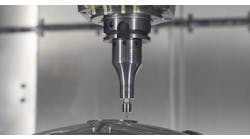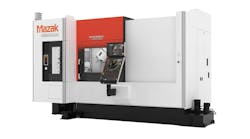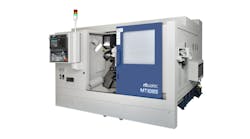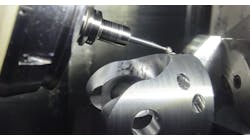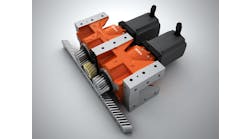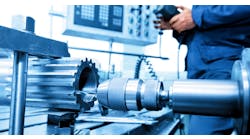Shops making thousand-dollar gears stay flexible and efficient.
The Gleason Pfauter hobbers at Unigear, Montreal, have reduced gearmanufacturing time from 3 hours to 20 min per gear.
The Gleason Pfauter P 400 G profile grinder has fully automated built-in gear inspection.
The PE 1200 G form grinder from Gleason enabled Northern Tool and Gear, Scotland, to grind two large sets of gears that other manufacturers said couldn't be ground.
Kyung-In Gear Manufacturing Co., Korea, uses a Gleason Pfauter P 2400 G profile grinder to quickly produce affordable, 6,000-mm gears.
For many gear manufacturers, productivity is measured by the volume of parts cranked out in an hour or day, and keeping costs down for customers means chipping away at setup and machining times while maintaining tolerances. On the other side of the coin, there are shops filling small orders for large-diameter, highquality gears, which often take days or weeks to machine and cost thousands of dollars. For the shops, keeping the cost down for the customer and maintaining profitability is a greater challenge, but with the help of high-tech equipment, even those in high-tolerance, big-gear production can turn a good profit.
Such was the case for Unigear, a company outside Montreal, Canada, that produces cylindrical gears as large as 240 in. in diameter to drive mining, steel processing, and pulp and equipment. To stay competitive and profitable, Unigear President Ron Mehra invested CNC machines that were many times productive than their manual counterparts. Those plant-technology upgrades slashed shop's average manufacturing time from three hours to 20 min per gear.
Mehra has predominately invested in Gleason Pfauter profile grinders and hobbers. Unigear started improving plant efficiency 12 years ago when replaced 20 manual hobbers with two CNC Pfauter hobbers. The most recent acquisition, a Gleason Pfauter 1200 G profile grinder, lets the shop combat the growing trend of shrinking leadtimes due to smaller inventories and more one-off requests. The machine has especially increased efficiency for hardfinishing gears in the AGMA Class 10 or higher levels. With this capability, Unigear tackled a $750,000/year project from a major U.S. pump manufacturer that had been buying its AGMA Class 14 spur gears from Switzerland.
"They tried to locate a domestic supplier, but two U.S. gear shops tried for eight months to produce the gear and failed to meet the tight standards," says Mehra. "But we thought we could do it with the Pfauter, and, after just eight weeks, we turned out the product and saved the customer $10,000 on each gear set. And the company has never reported a gear failure in the field."
Thanks to the success of the 1200 G, and a dedication to new technology, Unigear is also investing in Gleason's next-generation Pfauter P 400 G profile grinder. The system is equipped with many features, including on-machine inspection to analyze stock distribution and compensate for heat-treat distortion and part runout. Also, a dressing unit integrated with the machine's grinding head ensures high repeatability. It automatically compensates for wheel wear between dresses and for tooth twist, which corrects tooth-profile deviations and controls noise.
The flexible system grinds internal and external gears using either nondressable, high-precision vitrified or plated CBN wheels. An integrated Windows user interface with a proprietary-dialogue program provides quick, simple, and operator-friendly programming, and a grindingtechnology database makes recommendations for optimizing production methods. However, the feature that Unigear most appreciates is Gleason's custom service, which eliminates the domino effect caused by downtime.
"If we can't deliver one of our gears on time in a repair situation, this ultimately could mean that an entire steel mill is impacted, costing our customer millions," says Mehra. "When there is trouble, Gleason is either here in 24 hours or communicating immediately by phone, fax, or computer."
Another shop benefiting from cutting large gears on Gleason machines is Kyung-In Gear Manufacturing Co., one of Korea's leading producers of gears up to 6,000-mm in size. With the latest Gleason technology, the shop positions itself for increases in the number of high-speed gear boxes and speed-increaser gear boxes needed by the fast-growing windpower-energy field. Kyung-In Gear's new Gleason Pfauter P 2400 G profile grinder is producing results similar to those reported by Unigear—DIN quality classes improved by two steps, cycle times as much as 3 3 faster than competitive machines, delivery times cut in half, and vast reductions in production costs and manpower requirements.
On the other side of the world, Northern Tool and Gear, Arbroath, Scotland, increases efficiency in its gear shop using a Gleason Pfauter PE 1200 hobber and P 1200 G form grinder. The shop produces gears for everything from battle tanks to turbines—most in small lots that include helical, spur, worms and worm shafts, internal gears, and bevels. If they have a specialty, says Ian Strachan,Northern Tools' managing director, it's taking on the tough jobs that other gear manufacturers prefer to outsource.
"Our new Gleason machines enabled us to take on a job producing two large sets of double-helical ground gears that a U.S. gear manufacturer said couldn't be hobbed or ground. The gap between the right and left hand was too small for a hob or grinding wheel—at least they thought," comments Strachan. "We reasoned that the precise CNC control of the PE 1200 hobber would allow us to stop hobbing just before the hob touched the opposite hand. And the P 1200 G uses a smaller diameter grinding wheel than a generating gear grinder, so we could grind without interference. We shipped the order on-time and competitively priced."

